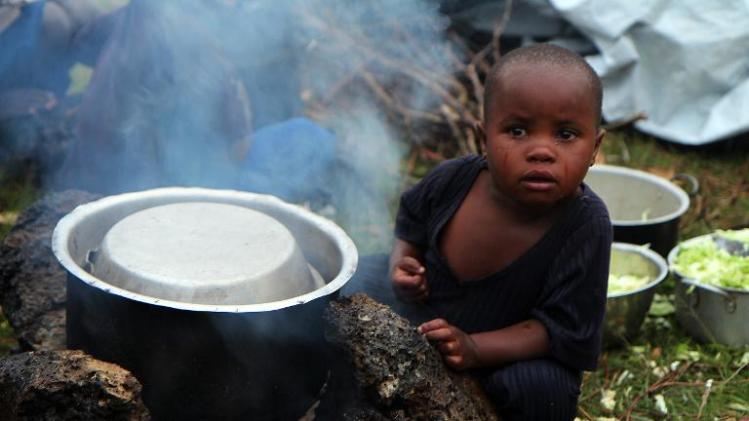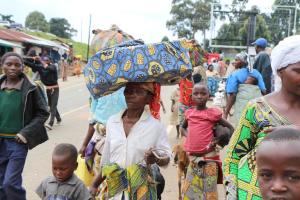Miserable wait for DR Congo's repeat refugees

Bunagana (Uganda) (AFP) - The Democratic Republic of Congo's army has wrested territory from rebels in the country's restive east in a dramatic week of military advances, but for those fleeing the fighting, life has been brutal.
Like thousands of other refugees, Jean-Nepomuscene Twizerimana sits miserably, sheltering under a eucalyptus tree in Uganda, as fighting against M23 rebel forces rages just across the border, barely a kilometre (mile) away.
Since the fall of their stronghold, the last M23 fighters -- thought to number between 200 and 300 -- have dug in on nearby hilltops for a final stand. Operations to dislodge them continued over the weekend.
The M23 rebel group was founded by ethnic Tutsis who were incorporated into the Congolese army under a 2009 peace deal, but who mutinied in April 2012. Kinshasa and the United Nations say they are backed by Rwanda and Uganda, an allegation the two neighbouring countries strongly deny.
At their strongest in November last year, M23 marched into Goma, a mining hub and city of one million people, and took control for 10 days, before regional leaders persuaded them into fresh peace talks.
And not for the first time: back in 1998, as a child, he fled with his family to Uganda when fighting raged between two rebel groups, the Tutsi RCD and the extremist Hutu FDLR.
He fled again in 2005 amid fighting between the national army and CNDP militia, and once more last year when M23 rebels moved in.
Aside from the emotional trauma, he has physical scars on his face. "The last time we took refuge here I had an accident. I was run over by a car as I was walking with other refugees," he explained.
Children lost
In a nearby muddy field, hundreds of other Congolese were sheltering from the rain under plastic sheets. Among them Noella Bigumashyaka, a 26-year-old teacher from the village of Jomba who fled for Uganda on Wednesday.
"I have two of my children with me, but I don't know what happened to the other two, they are only five and eight," she said weeping.
"There was a lot of shooting. We ran too quickly, abandoned our belongings along the road. We're dirty but we can't change our clothes."
"My field where I was growing beans was destroyed by bombs," said the woman, adding her mother was killed during one of the many times in the past when rival armies and rebels swept through the area.
According to the UN's refugee agency and the Ugandan Red Cross, roughly 10,000 Congolese refugees have poured into Uganda since the offensive against M23 rebels began a week ago.
Many have made the journey before, evidenced by Noella's plastic sheet that she was sheltering under. It was donated by the Red Cross the last time she and her family fled and she had kept it just in case.
"We don't have any clean water here," she said. "Sometimes some of the men are going back across the border to get some."
And like many refugees, she can't get to better shelter provided at a transit centre 22 kilometres (14 miles) further into Uganda.
"We don't have a vehicle to get us there," Noella said.
"If we do go there, we don't know if we'll be moved again," she added, looking back across to DR Congo where she hopes to quickly return, even if it means starting again from scratch.
Like thousands of other refugees, Jean-Nepomuscene Twizerimana sits miserably, sheltering under a eucalyptus tree in Uganda, as fighting against M23 rebel forces rages just across the border, barely a kilometre (mile) away.
On Wednesday, Congolese troops backed by a UN intervention force seized the key town of Bunagana, the main M23 rebel base near the eastern border with Uganda, forcing thousands from their fields and homes.
"When the M23 were there we were under the authority of rebels, people were miserable, because there was no peace," the 20-year-old said.
"But now the government has come in and nothing has changed... because we are now refugees here."Since the fall of their stronghold, the last M23 fighters -- thought to number between 200 and 300 -- have dug in on nearby hilltops for a final stand. Operations to dislodge them continued over the weekend.
The M23 rebel group was founded by ethnic Tutsis who were incorporated into the Congolese army under a 2009 peace deal, but who mutinied in April 2012. Kinshasa and the United Nations say they are backed by Rwanda and Uganda, an allegation the two neighbouring countries strongly deny.
At their strongest in November last year, M23 marched into Goma, a mining hub and city of one million people, and took control for 10 days, before regional leaders persuaded them into fresh peace talks.
But with the on-off talks yielding no result, the DR Congo army -- backed by a special United Nations force -- went on the attack a week ago in a bid to end the rebellion in the mineral-rich region once and for all.
Jean-Nepomuscene recounted how he was forced to flee his home empty-handed and said he was unaware of where his family was.And not for the first time: back in 1998, as a child, he fled with his family to Uganda when fighting raged between two rebel groups, the Tutsi RCD and the extremist Hutu FDLR.
He fled again in 2005 amid fighting between the national army and CNDP militia, and once more last year when M23 rebels moved in.
Aside from the emotional trauma, he has physical scars on his face. "The last time we took refuge here I had an accident. I was run over by a car as I was walking with other refugees," he explained.
Children lost
In a nearby muddy field, hundreds of other Congolese were sheltering from the rain under plastic sheets. Among them Noella Bigumashyaka, a 26-year-old teacher from the village of Jomba who fled for Uganda on Wednesday.
"I have two of my children with me, but I don't know what happened to the other two, they are only five and eight," she said weeping.
"There was a lot of shooting. We ran too quickly, abandoned our belongings along the road. We're dirty but we can't change our clothes."
"My field where I was growing beans was destroyed by bombs," said the woman, adding her mother was killed during one of the many times in the past when rival armies and rebels swept through the area.
According to the UN's refugee agency and the Ugandan Red Cross, roughly 10,000 Congolese refugees have poured into Uganda since the offensive against M23 rebels began a week ago.
Many have made the journey before, evidenced by Noella's plastic sheet that she was sheltering under. It was donated by the Red Cross the last time she and her family fled and she had kept it just in case.
"We don't have any clean water here," she said. "Sometimes some of the men are going back across the border to get some."
And like many refugees, she can't get to better shelter provided at a transit centre 22 kilometres (14 miles) further into Uganda.
"We don't have a vehicle to get us there," Noella said.
"If we do go there, we don't know if we'll be moved again," she added, looking back across to DR Congo where she hopes to quickly return, even if it means starting again from scratch.


No comments:
Post a Comment